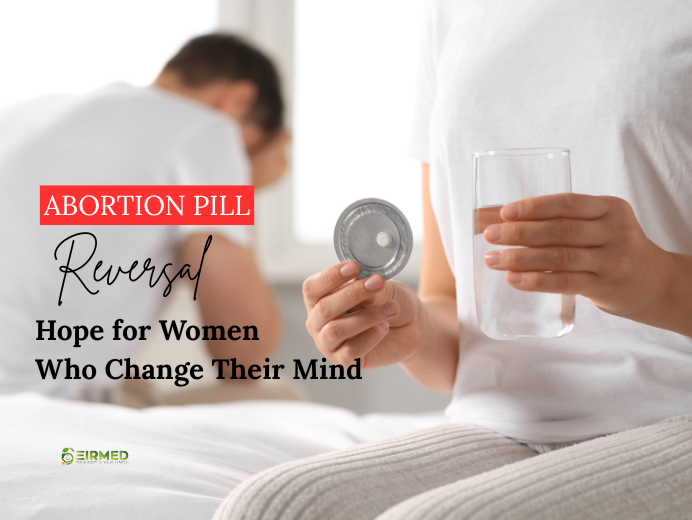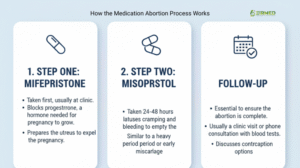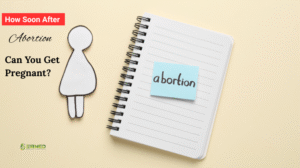Clear Guidance If Abortion Pill Changed Mind – Medical Explanation

5 Steps If You Took the Abortion Pill and Changed Your Mind
Abortion pill changed mind refers to a situation where a person takes the first medication for abortion but then decides to continue the pregnancy. The abortion pill, also known as medication abortion, involves two drugs: mifepristone and misoprostol. Mifepristone blocks progesterone, a hormone needed for pregnancy. If only the first pill is taken, there may be options to consider, but action must be quick. This article explains the process, evidence on potential reversal, risks, and next steps based on scientific sources. Data from groups like the American College of Obstetricians and Gynecologists (ACOG) show that claims about reversal lack strong proof. At EIRMED, a site focused on fertility, resources are available for those who choose to proceed with pregnancy. 🔗
What Is Medication Abortion?
Medication abortion uses drugs to end a pregnancy. It is approved for use up to 10 weeks from the last menstrual period in many places. The first drug, mifepristone, stops the pregnancy by blocking progesterone. This causes the uterine lining to break down.
The second drug, misoprostol, is taken 24 to 48 hours later. It causes contractions to expel the pregnancy tissue. The process can involve bleeding and cramps, similar to a miscarriage. Follow-up care checks if it is complete.
This method is done at home or in a clinic. Side effects may include nausea, diarrhea, or chills. It has a success rate of about 95 to 98 percent when both drugs are used as directed. 🔗
How the Medication Abortion Process Works

The process begins with a medical check. An ultrasound confirms the pregnancy stage and rules out issues like ectopic pregnancy. Mifepristone is taken orally, often at a clinic.
Misoprostol follows, usually at home. Bleeding starts within hours and can last up to two weeks. A doctor visit or test confirms completion. If not complete, more medication or a procedure may be needed.
Without the second drug, the pregnancy may continue in some cases, but risks exist.
Reasons for Abortion Pill Changed Mind
People may change their decision after taking the first pill due to various factors. These can include new information, support from others, or personal reflection. Studies indicate that regret after abortion is uncommon, but feelings can shift.
It is important to assess emotions and seek medical input promptly.
Signs That the Process Has Started
After mifepristone, some may experience light bleeding or no symptoms. If misoprostol is not taken, the pregnancy might persist. Heavy bleeding or severe cramps signal the need for immediate care.
Monitoring symptoms helps determine next actions.
Initial Steps If Abortion Pill Changed Mind
If abortion pill changed mind occurs after mifepristone but before misoprostol, contact a healthcare provider immediately. Provide details on timing and dosage. An ultrasound can assess the pregnancy status. 🔗
Acting within 72 hours is critical, as effects may progress.
Scientific View on Medication Abortion Reversal
Claims of reversing medication abortion involve giving progesterone after mifepristone. Some reports suggest success rates of 64 to 68 percent in case series. However, major medical organizations state there is no reliable evidence it works. 🔗 🔗
A randomized trial was halted due to safety concerns, including hemorrhage, and could not confirm efficacy. ACOG describes it as unproven and not recommended. 🔗
How Proposed Reversal Is Described
Proponents suggest progesterone counters mifepristone by supporting the uterine lining. It may be given as injections or pills for several weeks.
Evidence comes from observational studies without control groups, which limits conclusions.
Risks Associated with Reversal Attempts
Attempts may lead to incomplete abortion, infection, or birth defects if unsuccessful. In one study, participants experienced severe bleeding requiring emergency care. Progesterone side effects include fatigue and mood changes. 🔗
Medical groups advise against it due to insufficient data. 🔗
Options If Deciding to Continue Pregnancy
If choosing to continue, start prenatal care. This includes ultrasounds, blood tests, and vitamins like folic acid. Monitor for complications from the medication.
Adoption services are available if parenting is not preferred. Resources provide counseling on choices.
At EIRMED, fertility products such as supplements are offered for those supporting pregnancy health.
Emotional and Mental Health Considerations
Decision changes can cause stress. Counseling services offer neutral support. Hotlines provide confidential talks.
Mental health care is part of overall well-being during this time.
Medical Follow-Up After Changing Mind
Schedule exams to check viability. Tests measure hormones like hCG. Watch for signs of infection, such as fever or heavy bleeding.
Emergency care is needed for severe symptoms.
How Soon After Abortion Can You Get Pregnant?

1. Understanding the Basics
An abortion, whether medical (using medication) or surgical, ends a pregnancy. After the procedure, the body begins to return to its normal reproductive cycle. Ovulation — the release of an egg from the ovary — can resume relatively quickly once hormone levels start to stabilize.
2. When Ovulation Can Return
Medical research indicates that ovulation can occur as soon as 2 to 3 weeks after an abortion. In some cases, it may even happen within 8–14 days, depending on the individual’s hormonal response. This means that fertility can return before the next menstrual period, making pregnancy possible quite soon afterward.
Key points:
-
Most women ovulate around 2–4 weeks post-abortion.
-
Menstrual bleeding after an abortion is not a reliable sign of fertility status.
-
Since sperm can survive in the reproductive tract for up to five days, unprotected sex shortly after an abortion can lead to conception.
3. The First Menstrual Cycle After Abortion
A woman’s first period typically occurs 4 to 8 weeks after the procedure. This can vary based on factors like:
-
Type of abortion (medical vs. surgical)
-
Gestational age at the time of abortion
-
Hormonal fluctuations
-
General health and body weight
It’s important to note that bleeding immediately after an abortion is not a menstrual period — it’s the body’s way of expelling tissue and healing the uterus.
4. Contraception and Family Planning
Because fertility can return quickly, healthcare providers often discuss contraceptive options right after an abortion. Common choices include:
-
Hormonal methods: birth control pills, patches, injections, or implants
-
Barrier methods: condoms, diaphragms
-
Long-acting reversible contraception (LARC): IUDs or implants (which can sometimes be inserted immediately after a surgical abortion)
If a person wishes to avoid pregnancy, using contraception from the first act of intercourse after the abortion is recommended.
5. If Trying to Conceive After Abortion
For those who wish to become pregnant again, most medical professionals recommend waiting until:
-
After at least one normal menstrual cycle, to allow the uterine lining to recover fully.
-
The person feels physically and emotionally ready.
This isn’t a strict biological requirement — pregnancy is possible earlier — but it’s a practical guideline for monitoring future cycles and ensuring overall health.
6. Emotional and Physical Recovery
Abortion is a medical event that can affect both the body and mind. Physically, most people recover within a few days to weeks. Emotionally, recovery varies widely. Managing stress, seeking support, and consulting healthcare providers about family planning can aid in overall wellbeing and future reproductive health.
Research and Studies on the Topic
Early case reports claimed success, but critiques note flaws like no comparisons. A 2019 trial stopped early over safety, finding no clear benefit.
Ongoing research is needed for better data.
Impact on Future Fertility
Medication abortion generally does not affect long-term fertility. Most people can conceive later without issues. If concerns arise, fertility evaluations are available.
Healthy habits support reproductive health.
Suggested Video
Title: Changed your mind after taking the abortion pill?
Understanding the Abortion Pill
- The abortion pill is actually two medications: Mifepristone and Misoprostol. [00:47]
- Mifepristone is the first medication taken. It works by blocking the receptors for progesterone, the natural hormone the body makes to keep the developing baby attached to the uterus. [00:59]
- Misoprostol is the second medication, which causes uterine contractions to expel the detached baby and placenta. [01:12]
How Abortion Pill Reversal (APR) Works
- APR works by administering progesterone to the woman after she has taken the first pill (Mifepristone). [01:30]
- The goal is to “flood the progesterone receptors” to counteract the mifepristone, giving the baby and placenta the best chance of remaining attached and continuing to grow. [01:37]
Safety and Efficacy of APR
- In women who take only Mifepristone, the baby survives 9% to 25% of the time without intervention. [01:53]
- With progesterone treatment (APR), the survival rate for the developing baby increases to 64% to 68%. [02:01]
- Progesterone is a natural hormone and is considered safe, having been used for over 50 years for various conditions in pregnancy. [02:15]
- A study of over 700 women who used APR showed that the birth defect rate and preterm delivery rate were lower than the national average. [02:26]
If You Want to Reverse the Pill
- Time matters. If you have taken the first pill and wish to try APR, you should call as soon as possible. [02:42]
- You can call the 24/7 hotline at 855-209-4848 or visit reverseabortionpill.com to be connected with a healthcare professional in your area. [02:54], [03:05]
🔬 Scientific & Medical FAQ: The Abortion Pill and Post-Abortion Fertility
Q: What happens if I only take the first abortion pill and stop?
A: There are three possible outcomes if you only take the first pill (mifepristone) and do not take the second pill (misoprostol):
-
- The pregnancy might continue. This is one possible result, as the first pill alone does not end the pregnancy for everyone.
- The abortion might happen anyway. Even without the second pill, some people will bleed and pass the pregnancy.
- A “Missed Abortion” might happen. This means the pregnancy is no longer growing, but the tissue and blood don’t leave your body. If this happens, you will need further medical help (like taking the second pill or having a simple procedure) to avoid problems like infection.
Q: Is the first pill (mifepristone) dangerous if I decide to keep the pregnancy?
A: If the pregnancy continues after you take only the first pill, studies show it is unlikely that the mifepristone will cause birth defects or harm the baby later on.
Q: Does insurance cover the “Abortion Pill Reversal” treatment?
A: It depends. The cost of this treatment (which involves taking extra progesterone) changes based on the type of medication you need and what your insurance plan covers.
- The only way to know for sure is to call your insurance provider and ask them if they cover the specific prescription for progesterone.
- If you don’t have insurance or cannot afford the cost, some support networks may help you find ways to lower the price.
🤰 After the Abortion: Symptoms and New Pregnancy
Q: How quickly do pregnancy symptoms go away after taking the abortion pills?
A: Pregnancy symptoms do not go away instantly, but they fade quickly.
-
- Nausea is usually the first thing to disappear, often within 24 to 48 hours after you take the second pills.
- Tender breasts are often the last symptom to go away and can last for a week to 10 days or even longer.
Q: When can a doctor confirm a new pregnancy after an abortion?
A: You can ovulate and get pregnant as soon as two weeks after an abortion, but a home pregnancy test may not be accurate for a few weeks.
-
- Home pregnancy tests check for the hormone hCG, which stays in your body for a while after the pregnancy has ended.
- If you take a regular test too soon (before three weeks), it might show a false positive (meaning it says you are pregnant even when you are not).
- If you take a test three weeks after the abortion and it is still positive, or if your period hasn’t come after four to eight weeks, you should see a doctor. The doctor can use a blood test or an ultrasound to figure out if you have a new pregnancy or if there is simply some old pregnancy tissue remaining.
Q: What are the most common feelings or emotional reactions after a medical abortion?
A: It is completely normal to feel a lot of different emotions at the same time. The most common feelings are:
-
- Relief: This is the most frequently reported feeling.
- Sadness or Grief: Feeling sad about the end of the pregnancy is normal, even if you know the abortion was the right choice.
- Mixed Emotions: Many people feel a confusing mix of relief and sadness at the same time.
- Guilt or Shame: These feelings can happen even if you believe in the right to choose.
- Your emotions might feel intense because of the big hormonal changes happening in your body after the abortion. If you have long-lasting feelings of sadness, guilt, or depression, it is important to talk to a supportive person or a professional counselor.
Overall Purpose
This guide explains abortion pill changed mind with facts on the process, reversal evidence, and steps to take. It covers risks, options, and health checks from scientific sources. The goal is to inform without bias, helping readers understand choices. At EIRMED, fertility products are available if needed. Always consult doctors for accurate advice based on evidence.
Disclaimer
This content is for educational purposes only and not medical advice. Consult a qualified healthcare provider for personal guidance. EIRMED products support fertility but do not guarantee outcomes. Information is based on public sources; individual results vary. Decisions should be made with professional input.
Thank You
Thank you for reading this information on abortion pill changed mind. The aim is to provide factual details to aid understanding. At EIRMED, resources are available for fertility concerns. Seek professional guidance for your situation.

Eirmed is an informational platform dedicated to providing reliable, science-based insights on male and female fertility, reproductive health, and natural conception.
